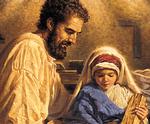Make your gift today!
Help keep Catholics around the world educated and informed.
Already donated? Log in to stop seeing these donation pop-ups.
fear of closure & the life of faith
By ( articles ) | Nov 19, 2005
Free eBook:

|
| Free eBook: Liturgical Year 2024-2025, Vol. 4 |
Amid the falling masonry of a disintegrating communion, the Archbishop of Canterbury has been pleading for patience with the latest round of theological committee-work. Though sympathetic to the Archbishop's dilemma, Al Kimel at Pontifications pointedly quotes Lutheran Robert Jenson's review of Williams's book On Christian Theology (from the Summer 2002 number of the journal Pro Ecclesia).
As the essays succeed each other, [Rowan Williams's] fear of closure begins to seem far too obsessive to be truly helpful in the life of faith. The confession into which teaching is supposed to lead us begins, after all, "I believe …," not "I wonder about…." Is it really the chief proper use of dogma and other theology "to keep the essential questions alive," indefinitely to sustain puzzlement? Should dogmas and other theologoumena serve mostly to remind us of the problems they pretend to resolve? God is indeed a mystery, but between honor for the biblical God's specific mystery and the kind of endless semi-Socratic dialectic Williams often seems to commend, there is, I would have thought, some considerable difference. No doubt argument and perplexity are permanent in the church's thinking, and no doubt this is a good and necessary thing; so that stirring up stagnant conviction must indeed be one task of theology. But, e.g., the phrase just cited, "to keep the essential questions alive," occurs in an exposition of "the doctrine of Incarnation," and the fathers of Chalcedon and 2nd Constantinople themselves certainly thought they were settling certain essential questions, in such fashion that conflict about them should not thereafter legitimately trouble the church. Their answers, of course, posed further and again difficult questions, but to say that this also was a good thing -- as I do -- is a different point than the one Williams presses -- or anyway I think it is. Apophatic thinkers though they were, the fathers of the christological councils -- to stay with that instance -- did not suppose that the purpose of their formulations was to keep alive the debates that brought them to the meetings.
As Chesterton famously wrote, "The point of an open mind, like that of an open mouth, is to close it on something solid." The Church, after all, is a larger enterprise than a theological debating society. People come to her to ask,"What must I do to inherit eternal life?" and cannot be brushed off with the advice to buy a subscription to the Journal of Theological Studies.
All comments are moderated. To lighten our editing burden, only current donors are allowed to Sound Off. If you are a current donor, log in to see the comment form; otherwise please support our work, and Sound Off!






